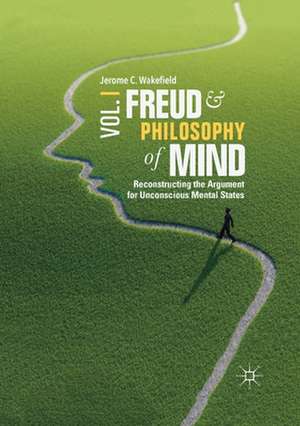Freud and Philosophy of Mind, Volume 1: Reconstructing the Argument for Unconscious Mental States
Autor Jerome C. Wakefielden Limba Engleză Paperback – 18 feb 2020
This book consists of a focused and systematic analysis of Freud’s implicit argument for unconscious mental states. The author employs the unique approach of applying contemporary philosophical methods, especially Kripke-Putnam essentialism, in analyzing Freud’s argument. The book elaborates how Freud transformed the intentionality theory of his Cartesian teacher Franz Brentano into what is essentially a sophisticated modern view of the mind. Indeed, Freud redirected Brentano's analysis of consciousness as intentionality into a view of consciousness-independent intentionalism about the mental that in effect set the agenda for latter-twentieth-century philosophy of mind.
| Toate formatele și edițiile | Preț | Express |
|---|---|---|
| Paperback (1) | 698.80 lei 6-8 săpt. | |
| Springer International Publishing – 18 feb 2020 | 698.80 lei 6-8 săpt. | |
| Hardback (1) | 704.17 lei 6-8 săpt. | |
| Springer International Publishing – 5 dec 2018 | 704.17 lei 6-8 săpt. |
Preț: 698.80 lei
Preț vechi: 822.12 lei
-15% Nou
Puncte Express: 1048
Preț estimativ în valută:
133.71€ • 139.98$ • 110.64£
133.71€ • 139.98$ • 110.64£
Carte tipărită la comandă
Livrare economică 05-19 aprilie
Preluare comenzi: 021 569.72.76
Specificații
ISBN-13: 9783030404352
ISBN-10: 3030404358
Ilustrații: XIII, 382 p. 1 illus.
Dimensiuni: 148 x 210 mm
Greutate: 0.47 kg
Ediția:1st ed. 2018
Editura: Springer International Publishing
Colecția Palgrave Macmillan
Locul publicării:Cham, Switzerland
ISBN-10: 3030404358
Ilustrații: XIII, 382 p. 1 illus.
Dimensiuni: 148 x 210 mm
Greutate: 0.47 kg
Ediția:1st ed. 2018
Editura: Springer International Publishing
Colecția Palgrave Macmillan
Locul publicării:Cham, Switzerland
Cuprins
1. Introduction: Freud and the Transformation of Psychology.- 2. “Unconscious” as “Mental but Not Conscious”: Why Examples of Repression, the Dynamic Unconscious, and Psychopathology Are Largely Irrelevant to Freud’s Philosophy-of-Mind Argument.- 3. The Semantic Objection to Freud's Thesis.- 4. Freud’s Response to the Semantic Objection: Concepts, Essentialism, and the Definition of 'Mental'.- 5. Freud and Brentano: The Cartesian Tradition that Confronted Freud.- 6. Cartesianism Without the Consciousness Criterion: Solving the Mystery of Freud's Missing Account of the Mental.- 7. Freud’s Direct Arguments Against the Consciousness Criterion: Does Freud Beg the Question of the Boundary of Psychology?.- 8: Freud on the Mind-Body Problem: Turning Psychophysical Parallelism on Its Head.- 9. Freud’s Argument for Brain Representationality as the Essence of the Mental.- 10. Conclusion: The Freudian Century in Philosophy of Mind.
Recenzii
“Jerome Wakefield’s meticulous and brilliant work, powered by his scholarly knowledge in the areas of philosophy and psychoanalysis, is displayed in this book and is welcomed in this context. … Wakefield’s work stands as an example of the kind of bridging that is necessary between these two fields.” (Cuneyt Iscan, Journal of the American Psychoanalytic Association, Vol. 70 (1), 2022)
Notă biografică
Jerome C. Wakefield, PhD (Philosophy), DSW (Clinical Social Work), M.A. (Mathematics: Logic and Methodology of Science) is University Professor, Professor of Social Work, Professor of the Conceptual Foundations of Psychiatry, Associate Faculty in the Center for Bioethics and in the Center for Ancient Studies, and Honorary Faculty at the Institute for Psychoanalytic Education, at New York University. Previous faculty appointments were at University of Chicago, Columbia University, and Rutgers University. He is the author of over 250 publications appearing in journals and books in psychology, philosophy, psychiatry, psychoanalysis, and social work, addressing issues at the intersection of philosophy and the mental health professions. He is Co-author of The Loss of Sadness: How Psychiatry Transformed Normal Sorrow into Depressive Disorder(2007, Oxford), named best psychology book of 2007 by the Association of Professional and Scholarly Publishers,and All We Have to Fear: How Psychiatry Transforms Natural Fear into Mental Disorder(2012, Oxford), as well as Co-editor of Sadness or Depression?: International Perspectives on the Depression Epidemic and its Meaning(Springer, 2016). In addition to Volume 2 of the Freud and Philosophy of Mind series, he is currently working on a book reexamining Freud’s case of Little Hans from philosophy-of-science and Foucaultian perspectives, to be published by Routledge.
Textul de pe ultima copertă
This book consists of a focused and systematic analysis of Freud’s implicit argument for unconscious mental states. The author employs the unique approach of applying contemporary philosophical methods, especially Kripke-Putnam essentialism, in analyzing Freud’s argument. The book elaborates how Freud transformed the intentionality theory of his Cartesian teacher Franz Brentano into what is essentially a sophisticated modern view of the mind. Indeed, Freud redirected Brentano's analysis of consciousness as intentionality into a view of consciousness-independent intentionalism about the mental that in effect set the agenda for latter-twentieth-century philosophy of mind.
Caracteristici
Argues that Freud is a major figure in the history of philosophy of mind Discusses how Freud’s unconscious mental states are the “missing link” intellectually between the consciousness-oriented views of the nineteenth century and today’s focus on meaning Continues the search for the nature of the hypothesized unconscious representational brain states that we have yet to complete
